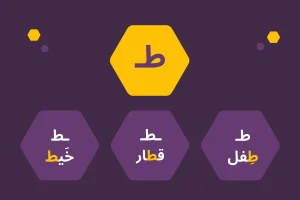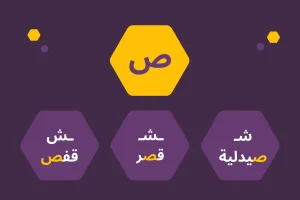
English words that come from Arabic
It is common for those who are learning a new language to use those words that have the same pronunciation. Those words can make it easier for beginners to learn new vocabulary and improve their speaking skills as they can pronounce them effortlessly.
Another advantage of these words is that they can help you get a glimpse of the Arabic culture when you learn the story and the reason why they are used in English. In this articles we will explore some examples of English words that come from Arabic. Stay with us.
Which English words have an Arabic origin?
Languages generally borrow words due to cultural contact among nations. Over the years, English people have interacted with Arabic people when trading or traveling to their countries. When they encountered something new, they sometimes used the given words by the native Arabic speakers instead of coming up with new vocabulary.
You can find English words with Arabic origin in different fields. It can be the name of a certain food or the name of something you use to make your food. It can be something you study in your school or the name of an animal you like watching at the zoo.
The words in English derived from Arabic could have been derived so many years ago. In such cases, you can notice that the word used today is different from its origin. The Arabic origin can be different but the influence and the similarity are clear.
English words from Arabic origin related to science
Years ago, the Arabic empire was large, wealthy, and thriving. During that period of time, there was a great interest in scientific research. Arabic scholars spent years and years studying old manuscripts and conducting experiments in different fields of science.
In the Islamic states in Baghdad, Damascus, and Cairo among other places, there used to be many different libraries, schools, and universities. They provided an amount of money for those who wanted to study and conduct their research, and the result was the advancement of science and many different discoveries and inventions.
Chemistry
Chemistry is a subject that is taught to every one of us in schools. But before it was known as we know it today, it was called alchemy. Alchemy is an Arabic word (الخيمياء), which was a practice that aimed to turn metals into gold. Alchemy attracted many students who conducted many experiments and discovered the properties of the elements thus they laid the foundations of chemistry.
Alcohol
The word Alcohol is derived from the Arabic Word Alkuhl which means kohl. The original word. Originally it was meant to describe certain tiny grains of powder used by women for cosmetic reasons.
It is not quite known how it was used later to the Spirits but now in Arabic, there are two different words, AlKuhul (الكحول) which means spirits, and Alkuhl which means Kohl.
Algebra
Algebra is an essential subject for any student. It is called (الجبر) in Arabic, from which the English term was derived. If you are into math, you are going to study algebra and learn how to use its symbols to solve a mathematical equation. This mathematical term was derived from the book called “The Compendious Book on Calculation by Completion and Balancing” in the 12th century when it was translated to Latin.
Algorithm, Algorism
Every time you use an algorithm, you should remember that the name was used to name it over the person who invented the steps to solve the mathematical problems Mohammad Al-Khwarizmi. Hence the Arabic term (خوارزمية) is given in Arabic after him before it was transferred to English among other languages.
Zero
Zero refers to emptiness and nothing. The word itself is not the same in Arabic but it was influenced by the Arabic numeral system. They latinized the word Cifr (صفر) and it became Zephrum then Zero.
Coffee
Have you ever wondered about the origin of the word “coffee”?
The word coffee comes from the Arabic term “qahwa (قهوة)” or Arabic qahwah, in some countries, which is related to the Arabic noun “quwwa (قوة)” meaning power or energy, the main characteristic property of our everyday beloved black beverage.
Cotton
Cotton is a soft usually white fibrous substance used to make clothes. It comes from the Arabic language “qutun (قطن)”. The original word passed from the Middle East to Spain, and from Spanish to other European languages.
Natron/ Natrium
According to the ancient Greeks, the word “nitron” referred to sodium carbonate, a chemical inorganic compound (a mineral salt found in dried lakes). Back in the medieval century, the medieval Arabs had this word spelled نطرون)) with the same meaning. In the early 19th century, shortly after sodium was isolated as an element for the first time, it was given the scientific abbreviation Na.
Crimson
Crimson is a rich deep red color inclining to purple. It is often considered the color of fresh blood. This English term has been recorded in English since 1400 A.D. and it can be traced back to its Arabic root “qirmiz” (قرمز/قرمزي) meaning a shade of the color red.
Azure
An English term that means a bright blue in color like a cloudless sky. According to the etymology dictionary, this word stems from the Arabic term lazaward (لازورد), which means “lapis lazuli”, a deep-blue metamorphic stone. The Arabic word actually refers to an area of Turkestan where Marco Polo collected lapis lazuli for friends back home.
Azimuth
Azimuth is one of the astronomical terms related to the language of science used to express an angular measurement in a spherical coordinate system. It originated from the medieval Arabic language (السموت /السمت) meaning “the directions”.
Fun English words from Arabic
You can find many words that are derived from the Arabic language. Some of these words are even used every day without you knowing that they have Arabic root. Yes, you have some Arabic vocabulary that you used every day!
Coffee
When you go to Café or a cafeteria and order some coffee, you are using an Arabic word. Coffee as many knows originated from the Arabic peninsula. There it is called Qahwa (قهوة), and Arabic coffee is a unique drink with a special flavor.
From the Arabic region, Coffee went to Turkey. There they called it Kahve. When it went to Europe later, the name was altered and it became known as Coffee.
Sugar
If you prefer your tea or coffee to be sweet, you are going to add a few pieces of sugar. The word Sugar is derived from Sukkar (سكر) in Arabic. Sugar was first known in India a long time ago, and Arabs used it for a long time. When it came to Europe, probably in the 14th century, they used the same similar word to name it.
Lemon, lime
As you try to prepare a plate of salad for your lunch, you probably add some lemon juice to get a better taste. Sometimes you can use lime instead of lemon. Either ways, those two words are Arabic, which are ليمون and ليم.
The Mediterranean region has known many types of citrus for long years, but just not the lemon. Lemon probably originated from India and Arabs brought it with them during the 12th century. When the Europeans were introduced to the lemon in Andalusia, they spelled the name Limon.
Orange
People who speak Arabic know that Orange translates to Burtuqal. Yet, we can say that Orange is derived from Arabic! A few centuries ago, we did not have Oranges in the Mediterranean basin. Arabic merchants brought oranges with them from India. These Oranges were bitter not like the ones we have today and they were called Naranj (نارنج) in Arabic. Today Oranges are still called Naranj in Spain, but in English and French, they use the name Orange.
Spinach
As kids, many of us watched Popeye the sailor open a can of spinach and gain incredible powers. Spinach is also another word that has an Arabic origin.
Spinach (سبانخ in Arabic) was known basically in Persia, and Arabic people introduce it to Andalusia. From there it spread to the rest of the European countries.
Shisha/sheesha
Also known as hookah or waterpipe, a single or multi-stemmed instrument for smoking flavored tobacco. This word is borrowed from the Egyptian historical slang (شيشة).
English words derived from Arabic medical terms
Most of the Medical terminology we have today comes of Latin origin. However, Arabic has had a great influence on the medical field. During the middle ages, there were many great Arabic doctors like Ibn Sina (Avicenna).
The books Avicenna wrote were taken to Europe where they have been studied for a long time. Some doctors also say that you can find words of Arabic origin, for Example:
Cell
Some people say that the word cell was derived from the word سلة which means basket.
Snare
A snare is a tool doctors use to perform certain surgeries and operations. While it is common to say that it is derived from the word Snour or Snara of the old Norwegian languages, others say it is derived from the word سنارة (pronounced snara) and mean sewing hook.
How many English words come from Arabic?
Arabic is considered the fifth most spoken language around the world dating back to approximately 512 BCE, with an estimated 315 million native speakers. It is also one of the most ancient and beautifully scripted languages ever existed. Its influence on Spanish is well known, but what is less well known is how many commonly used English words were actually taken from Arabic.
So here, one might ask the following question: “what is the percentage of English words that come from Arabic?”
It is estimated that there are 10,000 English words of Arabic origin, according to the language website Mother Tongue. But the Oxford English Dictionary (OED) has reduced the number to approximately 900 words by removing speculative derivations and proper nouns.
Arabic words with English origin
English has left a great impact on the Arabic language, just as it has on many other languages around the world. In every Arabic-speaking country, people at all levels of society occasionally tend to mix English with Arabic. Even people not fluent in English do some mixing now and then.
The Basic Arabic loan words in English language
As in many societies all over the world, English is considered a prestigious language in Arabic-speaking countries. Part of this popularity is because of the perceived economic or cultural benefits that come with speaking English as a second language, though necessity also plays a huge role here.
English speakers are spoiled when it comes to global communication. The English language has always been a primary language of software development, and as such, electronic devices tend to support English first and foremost.
Arabic has sadly been left far behind in this area. It took a while for popular operating systems to start supporting Arabic, and even until 2022, there are significantly fewer fonts, programs, and websites with Arabic display options.
Therefore, computer usage in Arabic is intrinsically linked with English. Not just in the typing of Romanized Arabic words using the Latin alphabet, but also in the vocabulary of computers, software, and the internet.
In a similar sense, the language of business is also linked with English. With the rise of globalization and internationalization, many firms based in Arabic-speaking countries are used to using English as a common language when dealing with other companies.
And, following the natural progression of the two points mentioned earlier, prestige and internet culture have led to “new” and “cool” companies adopting marketing and business terms from English wholesale—and expecting to be understood.
Naturally, when a word is adopted into another language, there is not always a perfect equivalent of the original meaning.
Let us look at a few examples of English words in Arabic whose meanings have shifted slightly along the journey.
Some Arablish Examples are message (مساج), goal (جول), check (تشك), format (فرمتة), etc.
Final Word
In this article, we talked about how the Arabic language has contributed hundreds of words to the English language through many different routes. As from around 700 A.D. to the Middle Ages, the Arabic kingdoms had a great influence on Europe and the world. In part, this was through colonization, but there were also many great Arab mathematicians, alchemists, and astronomers.
On the other hand, nowadays, and due to modern technology, English has deeply affected the Arabic language. Linguistically speaking, the Arabs borrowed several English terms related to computer science, business, and marketing.
Alifbee provides you with an incredible platform where you can enjoy a rewarding learning experience to dive and learn Arabic. We offer you a great opportunity to get to know the Arab culture and master formal MSA Arabic.




